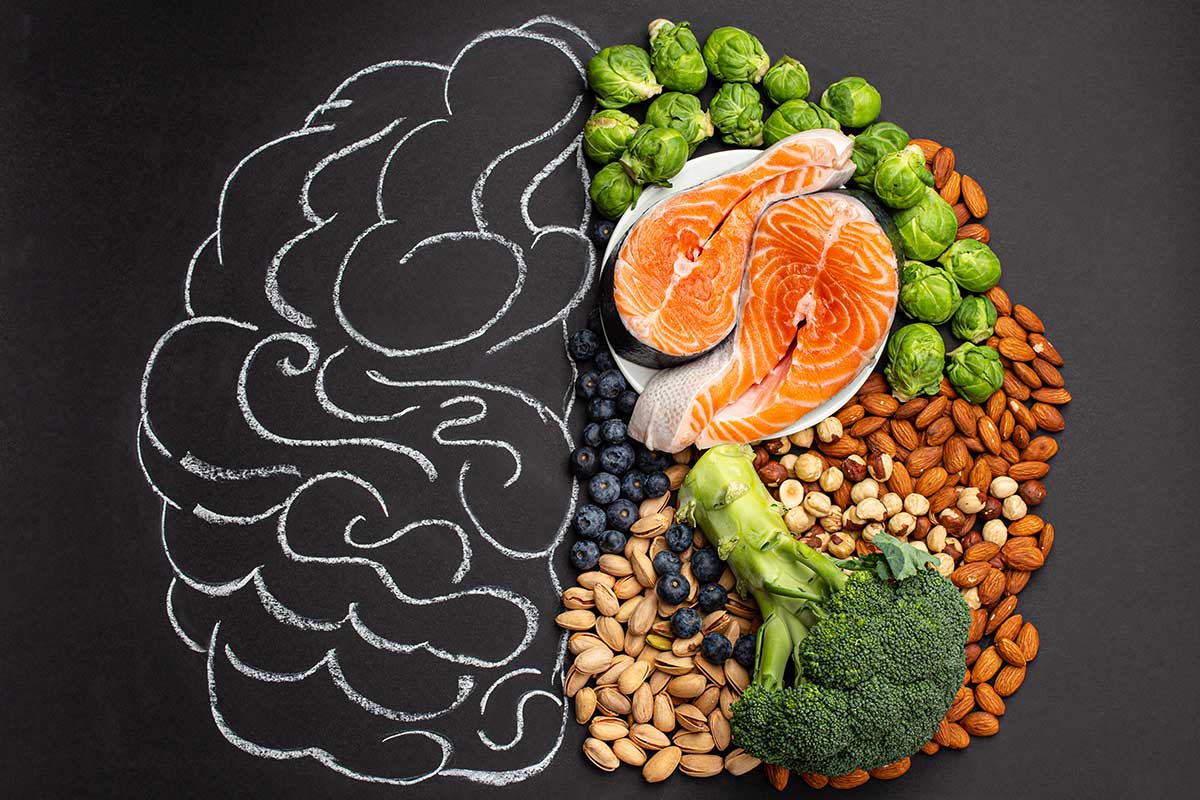Have you ever had trouble remembering something important? Or find that you lose your train of thought? Does that seem to happen more and more often? Science continues to unravel the underlying nature of our brain: What keeps it healthy for longer, and what contributes to cognitive decline (reduced ability to think and remember). The brain is sometimes referred to as the “control center” of our body. Beyond helping us think and remember clearly, the brain helps regulate important functions like breathing, temperature, hunger, and hormones. Keeping our brain as healthy as possible for as long as possible is important to stave off chronic—often uncurable—diseases like Alzheimer’s, and science shows us how to do this. There are six identified pillars of brain health which include: exercise, stress reduction, sleep, socialization, medications and supplements, and food and nutrition.
Exercise for brain health:
Exercise is incredibly beneficial for physical and mental fitness, to de-stress, improve sleep, and to keep the heart, lungs, and muscles healthy. There are several types of exercise, and all are beneficial. Aerobic exercise, or “cardio”, helps get your heart rate up and muscles warm. Examples of aerobic exercise includes biking, swimming, running, brisk walking and climbing stairs. This type of exercise benefits the brain by helping preserve existing brain cells and promote the growth of new ones. Another type of exercise is strength or “resistance” training such as pushing or pulling weights or other heavy objects (like groceries). Resistance training helps build and maintain strong bones and promotes brain health by enhancing concentration and improving decision-making skills. The key to success is combining both cardio and strength training.
Stress reduction for brain health:
We all experience stress. Stress is how the body and brain react to a threat (or “stressor”) and often called a “fight or flight” reaction. Symptoms are initiated by the brain when it detects a threat and include increased heart rate, rapid breathing, a heightened sense of focus among others. Once the threat is gone, the stress response relaxes, and the body and brain regain their normal (“low/no stress”) balance. Sometimes, stress lingers for days, weeks, and months and becomes “chronic” and create a negative health impact. Chronic stress can effectively shrink part of your brain responsible for memory and learning, affect our decision making capacity and problem-solving skills. Exposure to chronic stress can also lead to mood changes, anxiety, and depression. While stress cannot be eliminated entirely (and that’s arguably not an ideal goal anyway) there are effective techniques to better manage it and preserve brain health. One very practical strategy is to “just say no” to things you don’t have to do. Turn down unnecessary responsibilities to help reduce the amount of stress you feel. Get organized and prioritize tasks. Learn to ask for help when you need it. Reaching out for assistance helps build resilience and better manage stress. Calm the mind through meditation or guided imagery to help reduce the feelings of stress. Overall, understand that a stress-less life is impossible, so strive for healthier responses to stress by refocusing your attention on something positive and soothing
Sleep for brain health:
Getting 7-9 hours of sleep each night helps our mood and ability to manage stress. Lack of sleep interferes with memory and learning. You may feel your brain “moves slower” and you are more forgetful, your attention is short-circuited, and it is harder to concentrate. Fostering a regular sleep schedule is a fundamental first step. Go to bed and wakeup at about the same time every day—including weekends and when you’re traveling. A relaxing bedtime routine can start an hour (or more) before bedtime and include things like dimming lights, putting screens away (TV, internet, and smart phones), listening to soothing music or reading a book, or a warm bath.
Socialization:
Staying connected to a network of people you care about helps reduce stress, improve mood, and feel more supported. Social network and participating in social activities keeps your mind agile, promotes a sense of safety and belonging and improves cognitive function. You can socialize informally or spontaneously (like walking or chatting with a neighbor) or you can join organized activities like hobby groups, sports teams, or volunteering opportunities. The brain benefits of socializing even extend to pets. Studies show that pets can help you feel calm, improve your health, and enhance your social life, all of which can benefit your brain.
Medications and supplements:
Depending on your personal health situation, you may be advised to take medications or supplements. These can help reduce the risk for serious conditions and slow down the progression of diseases. Medical conditions linked to deteriorating brain health include high blood pressure, diabetes, and excess weight. They can increase your risks of cognitive decline (reduced memory and ability to think) and developing dementia. Excess weight per se is associated with over 200 diseases and studies show a direct link with mental health disease such as anxiety, depression, and Alzheimer’s disease. In addition to taking medications and supplements if needed, focusing on maintaining a healthy weight, treating and/or preventing excess weight and Obesity can help reduce their negative impact on brain health.
Food and nutrition for brain health:
There are several foods and nutrients that promote a healthy brain by slowing cognitive decline and reducing the risk of Alzheimer’s disease. University researchers developed the MIND diet to emphasize foods that are rich in antioxidants and critical brain nutrients such as vitamins and other plant-based phytochemicals while limiting consumption of butter, cheese, fried food, pastries, and red meat. Here are a few of the key foods and nutrients to boost brain health:
- Omega-3 fatty acids: A group of essential fats that promote heart and brain health. Some of the best sources of omega-3s are fatty fish such as salmon, herring, and sardines. The MIND diet recommends at least one serving of fish each week. If you don’t love fish, omega-3s are also found in nuts and seeds such as flax, chia, walnuts, and soy.
- More plants: Plants contain vitamins and minerals and are also a source of fiber and antioxidant phytochemicals. Some of the top plants for brain health are deeply colored fruits and vegetables like berries, leafy greens, and broccoli. The MIND diet recommends vegetables every day, at least six servings of greens each week, and at least two servings of berries each week.
- Spices and chocolate: These compounds contain antioxidants called flavonoids and can help improve blood flow to the brain and reduce inflammation. These can be found in high amounts in turmeric, cinnamon, ginger, and dark and unsweetened
- Coffee and teas: Did you know that coffee can help improve memory and ward off dementia? Up to three cups of black unsweetened coffee per day is recommended. When it comes to teas, black and green teas contain the highest amounts of antioxidants which is beneficial for brain health.
- Moderate consumption of red wine: Resveratrol is a compound found in red wine and the skin of red grapes. It is an antioxidant and is thought to reduce cell damage and protect against the formation of plaques in the brain. Too much alcohol is not good for your brain nor waistline, so it’s important not to overdo it. Try to stick with less than one glass of red wine per day if you’re a woman and less than two glasses per day if you’re a man.
- Whole grains: Whole grains like oats and quinoa are rich in brain-healthy B-vitamins and fiber, making them an important part of the MIND diet. B-vitamins are essential so that the brain can create energy, repair DNA, maintain the proper structure of neurons (nerve/brain cells), and create essential neurochemicals for optimal function. B-vitamins also act as antioxidants to reduce the harmful effects of free radicals that can damage brain cells (or any cells).
- Vitamin D: Also known as the “sunshine” vitamin because the skin makes it when it’s exposed to the sun. Low levels of vitamin D are associated with increased risks for brain disorders such as Alzheimer’s. You can increase your vitamin D levels by going in the sun for 5-15 minutes three times a week. Moderation is key so try not to get too much sun without sunscreen due to the risk for skin cancer. Vitamin D supplements are widely available so talk to your healthcare provider to find the right one for you.
- Limit red meat: Consuming too many foods high in saturated fats is linked with an increased risk for heart disease and Alzheimer’s disease. The MIND diet recommends no more than two servings of red meat per week. Try limiting red meat, butter, deli meats or other processed meats whenever possible and consider substituting with beans or lentils.
In summary, there are many things you can do to bolster your brain health. Include healthy habits such as exercise, stress reduction, enough sleep and socializing with others (or with pets) in your daily routine. Food and nutrition play an essential role in preserving brain health and preventing disease. Following recommendations for medications, managing your weight and waistline, and including optimal food and nutrition habits in your diet contributes to disease risk reduction and longevity. If you’re interested in learning more about how to implement these six essential brain health strategies into your life, or what your nutrition plan would look like, contact us today to schedule a visit with our board-certified healthcare team.
@evexiamed
Florencia Ziemke MD, dABOM





